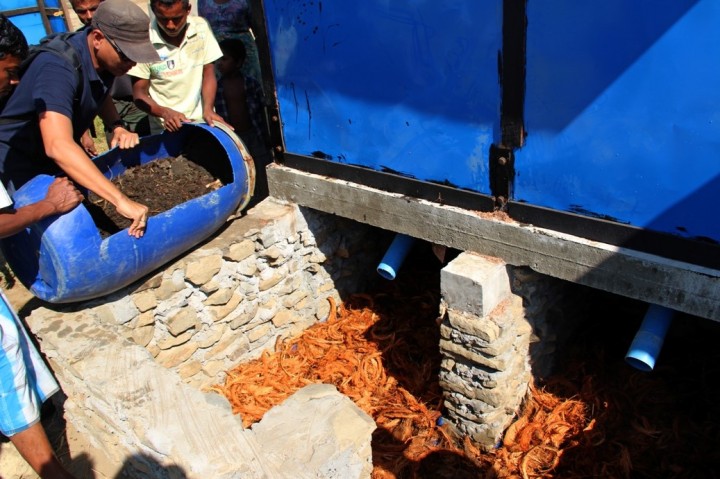Purpose
Sustainable sanitation for humanitarian responses: Tiger Worm Toilets (TWT) for communal sanitation
Activities
1. Design workshop – bringing together experts in worm based sanitation, humanitarian sanitation and those from the camp area to produce appropriate design(s) which are costed in relation to local availability of materials and the skill set of local labour and contractors.
2. Implementation – 17 communal TWT blocks with 34 pans (two pans per block, used by ten families) have been constructed in the Say Tha Mar Gyi IDP Camp in rural Sittwe, Rakhine State, Myanmar. In addition, 45 household TWT have been constructed in Mingan IDP Relocation Area, where there are pilots of a smaller surface area in the tank (0.7m2 rather than 1m2) and phased addition of worms one month after the toilet has been in use. Users have been sensitised to these new toilets and the way in which the system works.
3. Monitoring – structured observation of both the Tiger Worm Toilet and control latrines, including:
- Usage
- State of the superstructure i.e. cleanliness, odour and smells
- Faecal sludge and vermicompost accumulation
Every quarter, focus groups are used to collect user feedback. After a period of 12 months, all systems are emptied and the faecal sludge and vermicompost is collected at the camp level to prepare life cycle costs (over a 10 year period).
4. Evaluation - results to be disseminated in the humanitarian sector by Oxfam, our collaborative research partner Dr Claire Furlong at UNESCO-IHE Delft Institute for Water Education, and the local institutions in Myanmar. The evaluation includes a technical, life time cost and user evaluation, which will be compared to the existing and traditional practice of pit latrines.
5. Adaptation - adaptations incorporating the learning from a year’s trial. This is written into a ‘Design, Operations & Maintenance Manual’ and an ‘Implementation Manual’ for the humanitarian sector.
Images

Image: Setting up tiger worm pit © Rhea Catada - Oxfam
Countries of activity
Location of main activity
Objectives
The specific project objective is to assess the viability of the tiger worm toilet for communal sanitation within the context of humanitarian camps in Myanmar. The project will produce a Design and Operation Manual and an Implementation Manual for the TWT, providing a ‘pick up and go’ pack to be used and replicated by other WaSH stakeholders - thus increasing the use, experience and scale of TWT.
Our long term goal is to find an effective and efficient communal sanitation system suitable for a range of users that is sustainable, cost-effective and that considers the whole sanitation chain (containment, emptying frequency and treatment).
Further information
This innovative application of a worm-based onsite sanitation system provides adaptability and flexibility: the latrine design can be offset or directly below the toilet, above or below the ground, can utilise an array of local materials for the vermifilter and can be adapted to urban, rural, camp or household level contexts.
The driver for change is odour-free toilets that do not need costly desludging or re-digging of pits, and that can be implemented in a range of contexts and users. Durability of sanitation systems is also critical, especially in respect of the fact that refugee camps caused by protracted crises frequently last for many years, if not decades.
The use of vermicompost in agriculture is already well established in Myanmar, and the project has succeeded in securing a supply of worms from two breeding centres in Yangon for the first phase of the project. However, challenges in obtaining sufficient quantity of worms within the planned timeframe for toilet construction has led Oxfam to set up its own wormeries too. Worm rearing has provided us an opportunity to link our humanitarian response with existing livelihoods work around agriculture in the area, providing an independent worm supply in the actual location where the TWTs are being installed.
The innovation will improve user experience due to it being conducive to those who use water for washing or flushing (the worms like, and need water), odourless and fly-free. The TWT digests, and consumes the faecal waste thereby reducing the need for emptying. To date, very few household systems have needed emptying – it is estimated they will require emptying once every five years, and this can be easily carried out by removing the vermi-compost from the top of the unit. This by-product is dry, odourless humus that can be used as a soil conditioner or buried on-site.
This is an Innovation Fund project.
Contact information
Jenny Lamb
Login to see the e-mail-adress of the contact person.
Filter tags
Camps (emergency or longer term) Community sanitation East Asia & Pacific Emergency and reconstruction International NGO Other funding source or unspecified Practitioners Specific to one or several countries Toilets or urinals (user interface) Treatment of faecal sludge Vermifilters, vermifilter toilets
















